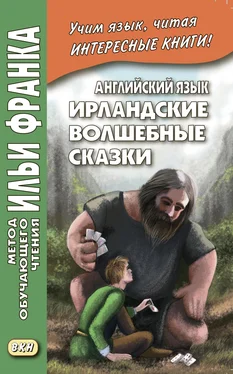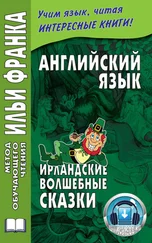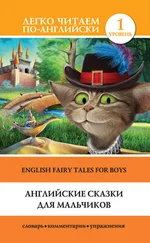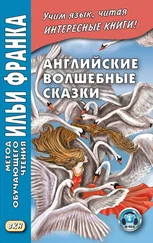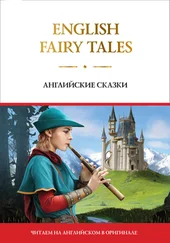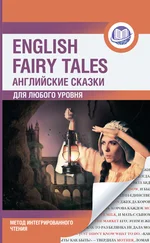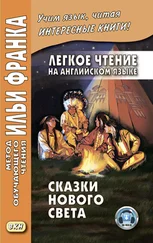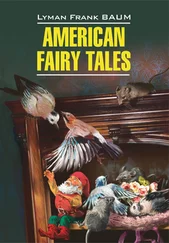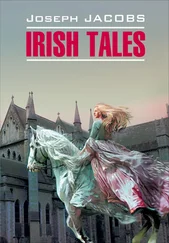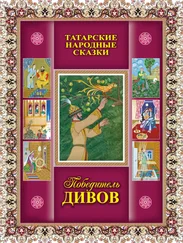That minute his youngest daughter came, took the king’s son out of the tank, placed plenty to eat and to drink before him, and gave him a good bed to sleep on that night.
The giant’s daughter watched(дочь великана бодрствовала /всю ночь/; to watch [wɒʧ] – наблюдать, следить; дежурить /особ. ночью/ ) till she heard her father stirring before daybreak(пока /не/ услышала, как ее отец зашевелился /в постели/ перед /самым/ рассветом; daybreak ['deɪbreɪk]) ; then she roused the king’s son(тогда она разбудила королевского сына; to rouse [raʋz] – будить, поднимать ) , and put him in the tank again(и снова положила его в чан).
Soon the giant came to the tank and called out(вскоре великан пришел к чану и крикнул),
“Are you here, son of the king of Erin(ты здесь, сын короля Эрина) ?”
“I am(я /здесь/) ,” said the king’s son(сказал = ответил королевский сын).
The giant’s daughter watched till she heard her father stirring before daybreak; then she roused the king’s son, and put him in the tank again.
Soon the giant came to the tank and called out,
“Are you here, son of the king of Erin?”
“I am,” said the king’s son.
“Well, come out now(что ж, выходи теперь) . There is a great work for you today(имеется немалая работа для тебя /на/ сегодня; there is – имеется, есть: «там есть»; great [ɡreɪt] – большой, огромный; значительный; work [wɜ:k]) . I have a stable outside(у меня есть конюшня снаружи = вне замка; stable ['steɪbl] – конюшня; стойло; outside [,aʋt'saɪd]) , in which I keep five hundred horses(в которой я содержу пятьсот лошадей; to keep – держать, хранить; содержать; horse [hɔ:s]) , and that stable has not been cleaned(и та конюшня не была чищена = ее не чистили; to clean [kli:n] – чистить; clean – чистый ) these seven hundred years(эти /последние/ семьсот лет).
“Well, come out now. There is a great work for you today. I have a stable outside, in which I keep five hundred horses, and that stable has not been cleaned these seven hundred years.
My great-grandmother(моя прабабка; grandmother ['ɡræn(d),mʌðə] – бабка, бабушка ) when a girl(когда /была/ девочкой) lost a slumber-pin(потеряла сонную булавку [4] «Сонную булавку» (англ. slumber-pin , ирл. bar an suan ) по ирландскому поверью использовали волшебные существа ( fairy ), чтобы усыпить или сделать немым какого-либо человека (для этого «сонную булавку» незаметно втыкали в его волосы).
; to lose; slumber ['slʌmbə] – сон, дремота; pin – булавка, шпилька ) somewhere in that stable(где-то в той конюшне; somewhere ['sʌmweə]) , and never could find it(и так никогда и не смогла найти ее; never ['nevə] – никогда; вовсе не ) . You must have that pin for me(ты должен найти для меня ту булавку: «иметь/получить ту булавку для меня») when I come home tonight(/к тому моменту/ когда я вернусь домой сегодня вечером) ; if you don’t(если же ты не /найдешь ее/; don’t [dəʋnt]) , your head will be on the seven hundredth spike tomorrow(твоя голова завтра будет на семисотом колышке; tomorrow [tə'mɒrəʋ]) .”
My great-grandmother when a girl lost a slumber-pin somewhere in that stable, and never could find it. You must have that pin for me when I come home tonight; if you don’t, your head will be on the seven hundredth spike tomorrow.”
Then two shovels were brought for him to choose from(затем две лопаты были принесены для него, чтобы выбрать из /них/ = чтобы он выбрал одну из них; shovel ['ʃʌv(ə)l] – лопата; совок; to bring – приносить; to choose [ʧu:z] – выбирать ) to clean out the stable(чтобы вычистить конюшню) , an old and a new one(старая и новая) . He chose the new shovel(он выбрал новую лопату; chose [ʃəʋz]) , and went to work(и приступил: «пошел» к работе).
Then two shovels were brought for him to choose from to clean out the stable, an old and a new one. He chose the new shovel, and went to work.
For every shovelful he threw out(на каждую лопату /полную грязи/, которую он выбрасывал наружу; shovelful ['ʃʌv(ə)lfʋl] – полная лопата, полный совок: one shovelful of smth. – количество чего-либо, помещающееся на лопате; to throw /threw, thrown/ – бросать ) , two came in(две /другие лопаты/ возвращались вовнутрь: «приходили внутрь») ; and soon the door of the stable was closed on him(и вскоре дверь конюшни была = оказалась закрыта за ним; soon [su:n] – скоро, вскоре; door [dɔ:] ; to close [kləʋz] – закрывать; closed [kləʋzd] – закрытый ) . When the stable-door was closed(когда дверь конюшни оказалась закрытой) , the giant’s daughter called from outside(дочь великана крикнула с улицы: «снаружи») : “How are you thriving now, king’s son(как ты сейчас преуспеваешь = как у тебя получается, королевский сын; to thrive [θraɪv] – преуспевать ) ?”
For every shovelful he threw out, two came in; and soon the door of the stable was closed on him. When the stable-door was closed, the giant’s daughter called from outside, “How are you thriving now, king’s son?”
“I’m not thriving at all(я не преуспеваю вовсе = ничего у меня не получается) ,” said the king’s son(ответил: «сказал» королевский сын) , “for as much as I throw out(ибо столько же, сколько я выкидываю наружу) , twice as much comes in(в два раза больше возвращается обратно: «входит вовнутрь»; twice [twaɪs] – дважды; вдвое ) , and the door is closed against me(и дверь закрыта против меня = и я оказался взаперти; against [ə'ɡenst], [ə'ɡeɪnst]) .”
Читать дальше
